| |
"So far no cause whatever for the fear of the runner had been shown; but now there began to be seen, far up the shore, a little flicker of something light-coloured moving to and fro with great swiftness and irregularity. Rapidly growing larger, it, too, declared itself as a figure in pale, fluttering draperies, ill-defined. There was something about its motion which made Parkins very unwilling to see it at close quarters. It would stop, raise arms, bow itself toward the sand, then run stooping across the beach to the water-edge and back again; and then, rising upright, once more continue its course forward at a speed that was startling and terrifying." |
| |
Oh, Whistle, and I'll Come to You, My Lad – M.R. James |
When the BFI announced that they would be releasing all of the films that fell under the BBC's Ghost Stories banner, which due to the timing of their annual appearance later became known as A Ghost Story for Christmas, there were a few shouts of joy from us fans of low-key, old school tales of the supernatural. Previously only three of the twelve films – three of the best, as it happens – had been made available on UK DVD, all by the BFI – Whistle and I'll Come to You and A Warning to the Curious were both adaptations of stories by M.R. James (more on him below), while The Signalman was a rare tale of the supernatural by Charles Dickens, whose 1843 novella A Christmas Carol gave us three of literature's most famous ghosts. The films are not action or effects-driven ghost stories, but tales that unfold almost as genteel mysteries and are designed to quietly unsettle rather than terrify or shock. Many are period pieces, set in the time in which the stories on which they are based were written, and are handled with the sort of formality and restraint often associated with BBC TV period dramas of years past.
The first volume contains two adaptations of the same story, M.R. James' Oh, Whistle, and I'll Come to You, My Lad, which was originally published in 1904. The first was shown in 1968 as part of the BBC's Omnibus arts series, the second in 2010, by when the annual Ghost Story for Christmas slot was firmly established. Both offer very different takes on the original tale, the first largely being faithful to it and the second using it as a basis to explore different ideas.
As my views have not significantly altered in the intervening years, the review immediately below of the 1968 version is essentially the same one that I originally posted back in 2003 for my coverage of the film's stand-alone DVD release, and includes an introduction to the story's esteemed author.
| Whistle and I'll Come to You (1968) |
|
Montague Rhodes James was born in 1862 and remains to this day one of Britain's finest ever writers of ghost stories. His tales frequently have an autobiographical quality to them, often including an academic angle (James spent a good part of his adult life at King's College, Cambridge, eventually becoming Dean and later Vice-Chancellor of the University) and featuring characters who are prompted through experience to re-evaluate their previous cynicism about the supernatural, reflecting James' own detailed studies of the early history of the bible. James was primarily a scholar, a historian and a prolific writer, and regarded his ghost stories almost as a hobby. But his use of language, character detail and the manner in which the narratives unfold made them essential reading, and their influence on other genre writers and even film-makers has proved to be substantial. Several of his stories have been adapted for television, usually by the BBC as part of the Ghost Stories series, though only one made the transition to the big screen when his 1911 Casting the Runes became one of the cinema's best ever tales of the supernatural, Night of the Demon (it was also adapted for television in 1968 as part of the series Mystery and Imagination and again in 1979 as an episode of ITV Playhouse). But of the TV adaptations, the 1968 version of Whistle and I'll Come to You still stands as the finest.
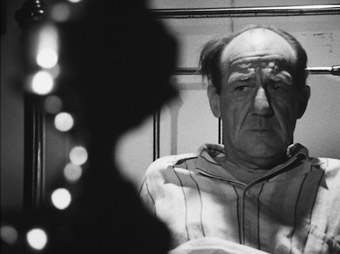
The school term has ended, and academic Professor Parkins arrives at a seaside inn on the East Anglian coast for a holiday of rambling and reading. While on one of his walks, he discovers a cemetery perched on the edge of a cliff that is in the process being reclaimed by the sea. Here he unearths an old metal whistle bearing a strange inscription, which he translates and acts upon, scorning its potentially supernatural overtones. But he is soon given cause to question his long-held scepticism.
Whistle and I'll Come to You was produced for the BBC's Omnibus arts programme, which is why it opens with a spoken introduction by its director, Jonathan Miller, who provides a brief overview of the author's work and outlines the nature of the tale that is about to unfold. What follows makes a few small changes to James' original story, largely in the personality of Professor Parkins. Described by James as being "young, neat, and precise in speech," here he is almost the opposite – as played by Michael Horden he is middle-aged, eccentric and lost in his own world, a cinematic archetype of a Public School Professor. In most other respects, however, the film is remarkably faithful to James' original text.
To a modern audience, who have come to expect a big twist at the end of their ghost stories and are accustomed to being told loudly through music and editing when it's time to feel scared, the more subtle and uncluttered narrative of Whistle and I'll Come to You may at first glance feel a little primitive. But this simplicity allows Miller and Horden the scope they need to develop the film as a character study, with Dick Bush's immaculately framed camera observing Parkins with almost microscopic precision. The film is told very much told from Parkins' point of view, and thus never shows us anything he cannot see, hear or – in a particularly unsettling sequence – dream. Horden is an absolute joy here, investing so much into every line and action that the film demands repeated viewing just to observe him at work, whether it be his breakfast mutterings, his philosophical musings on seemingly simple questions, or the jovial manner in which he eats his packed lunch. There are precious few other characters of note in the story, but as the hotel proprietor, George Woodbridge has an irresistibly funny scene in which, exhausted from carrying Parkins' bag upstairs, he breathlessly mumbles a series of indecipherable noises that stand in for a description of the facilities, punctuated by odd clear words like 'bathroom' or 'dinner at eight', all of which Parkins appears to understand.
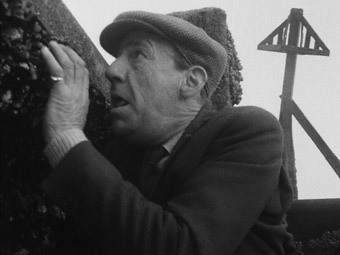
Even at only 42 minutes in length, the film is in no hurry. With the pared-down plot and only one major character, Dr. Miller – a producer and director of considerable standing who has worked extensively with Shakespeare and was one of the original members of Beyond the Fringe – is able to really get inside Parkins' head, using his lead actor and some striking locations to create an unnerving sense of a disrupted normality in which undefined dangers are stalking us even in daylight. This is brought home through Miller's refusal to over-dramatise key moments, with the discovery of the whistle and the reading of its inscription presented in an almost everyday manner, and no dramatic music or creepy camera movements to hammer home their significance. With no music score to lean on, a sense of genuine menace is created solely through camera placement, Horden's facial expressions and a chilling and innovative use of sound effects, whether it be the rustling of sheets in a supposedly unoccupied bed or the sharp noise that pulls Parkins out of his nightmare, one that was re-used five years later to equally jarring effect in William Friedkin's standard-setting The Exorcist.
Whistle and I'll Come to You is a marvellously executed tale of the supernatural, a genuinely chilling ghost story that also delivers as a fascinating character study. It may lack the narrative complexity and big surprise ending of more recent cinematic genre outings, but it still shines in its excellent central performance, its canny direction, its increasingly unsettling sense of foreboding, and a final scene that while refusing to provide pat explanations or even a real conclusion, still manages to send serious shivers up my spine on every viewing.
| Whistle and I'll Come to You (2010) |
|
When the Hollywood remake machine really got going a few years ago, I remember someone asking me why they only ever chose to remake films that didn't need remaking instead of ones that had botched up a decent idea. It's about money, of course, and it's long since been established that you've an easier sell if you're trading on an already famous name. The same principle theoretically applies to television, at least if you're selling advertising space. But when it comes to the BBC, who are in theory not required to bow to the non-creative demands of companies hawking products, then the motives are less clear. I, for one, was certainly a little bemused by the their decision to remake what remains to this day the finest made-for-TV ghost story. There seemed to be no good reason for it beyond producing a version that was in colour, set in modern times and that filled the 16:9 frame (which it doesn't, as it happens, having been shot 2.35:1). But I was nonetheless intrigued. A lot of film horror has washed under the bridge since Jonathan Miller's superb 1968 TV chiller, and it was just possible that a new take could still prove effective if it approached the source material from a different angle. Well it certainly does that.
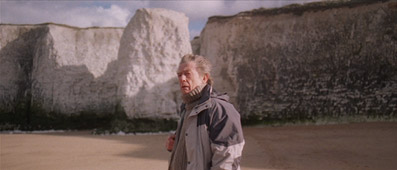
Where Jonathan Miller's original stuck closely to James' original text, the newer film, from writer Neil Cross and director Andy De Emmony, uses only the bare bones on the story and then goes its own way with it. A bold move perhaps, but what makes the written word and Miller's adaptation work as well as it does is not down solely to a few key components, but the manner in which they combine and unfold, and the unsettling ambiguity of the possible threat. By clearly defining the supernatural force that so terrorises the 2010 Parkin (the last letter of his surname was dropped for this version), Cross and Emmony strip away one of the very things that made it so unnerving in the first place – its inexplicability. Screenwriter Evan Hunter has famously complained about Hitchcock's decision not explain why the title creatures in The Birds suddenly turned on humans, but it's precisely that ambiguity that continues to make that film so terrifying, denying the audience, as it does, the psychological safety net of being able to question the plausibility of the cause.
The new Parkin diverges even further from the original text than Michael Horden's eccentric professor. Here he is a married man in late middle-age, and his isolation is not self-imposed but the result of his wife's steadily deteriorating dementia. In the opening scene he is shown admitting her to a care home whose identically dressed occupants sit in a dimly lit room in semi-comatose rows, like subjects for experimentation in a dystopian science fiction drama. The holiday he takes is thus less a vacation than an opportunity to reflect and come to terms with his wife's illness, which provides a perfectly plausible explanation for the off-season emptiness of the hotel in which he stays. That the story has been relocated from East Anglia to Devon is never an issue, but that the object Parkin finds is a ring rather than a whistle most definitely is. With nothing to blow into to summon up the spirit, the title is effectively robbed of its meaning and has to be justified instead by having Parkin whisper the words into his wife's ear in the manner a fond poem from their youth. And I can't be the only one who associates gold rings bearing inscriptions more with J.R.R. Tolkien than M.R. James.
From this point on the film is in largely familiar haunted house territory, with a nightlight that repeatedly switches itself off of its own accord, an unflattering bust that seems to watch Parkin sleep, and an unseen figure that attempts to enter his room at night by loudly and aggressively rattling and banging the door. It's that last one that best symbolises the film's failure to recognise was made its source material unique, with the troubling but too-familiar monster beyond the door – a seriously scaled down version of a terrifying sequence in Robert Wise's seminal The Haunting – no match for the original's more frightening suggestion that the entity was entering Parkins' room at night and sleeping in the adjascent bed.
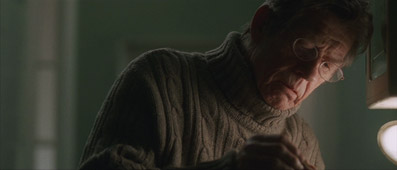
As Parkin, John Hurt expertly captures the loneliness of a man facing a future without the woman who has been his companion for most of his adult life. He wears his unhappiness like an oppressively heavy overcoat, a mood externalised through the hotel's dark wooden panelling and Rob Hardy's atmospheric but gloomy and often colour-drained cinematography. This lack of variance in mood ultimately works against Hurt's otherwise impressively understated performance, making his incarnation of Parkin far less arresting than Michael Horden's glorious ball of professorial eccentricity, one whose twitchy mannerisms and contemplative delivery enlivened and textured even the quietest of scenes (just watch Horden as he sits waits in the dining room for his dinner to arrive).
Despite its vivid sense of melancholia and some solid location work (the West Country beach here is as bleak and unwelcoming as the hotel in which Parkin is the sole guest), the 2010 take on Whistle and I'll Come to You sits deep in the original's shadow on pretty much every count. It trades in many of the things that so distinguished Miller's film for well-worn genre motifs, right down to the rapid-fire editing and heavily symbolic imagery of the dream sequences, and the use of music to more clearly indicate when and how we should react at any one time. As horror scores go, the almost avant-garde one here by Nick Green and Tristin Norwell is rather effective, but still feels overstated when compared to what Miller achieved solely with silence and sound effects. But the biggest let-down has to be the climax, which dispenses with the original's disturbing ambiguity in favour of something too weak in concept, too determined to explain itself, and too tainted by J-horror cast-offs to prompt more than a weary groan.
When I reviewed the original DVD release of the 1968 version back in 2003 I expressed some delight at the 1.33:1 transfer, whose clarity, detail and well balanced contrast were far better than I had expected for a British TV production of this vintage. Nine years later the same transfer still impresses, but after several years of exceptional digital restorations, I'm a little more sensitive to the occasional defects in the source material here, principally the dancing white dots that appear in some scenes and whose appearance and disappearance on a shot-by-shot basis suggests they may be specific to one or two reels of the original footage. At its best, however – the night-time close-up of Horden's face during the dream sequence, or the scene where he first finds the whistle in the crumbling graveyard – the image quality is close to excellent.
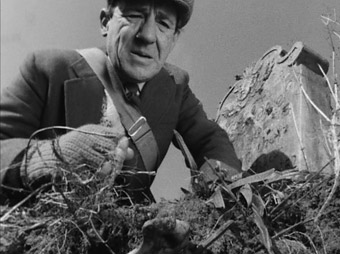
As a digitally shot, edited and mastered modern production, the 2.35:1 anamorphic transfer of the 2010 version is at its best most impressive, showcased in the scenes in which Parkin sits outside or walks along the beach. The softening of contrast, low light levels and heavy brown tinting of the night time interiors, however, can make the image feel a lot less crisp than it actually is, particularly as black levels take a complete hike here.
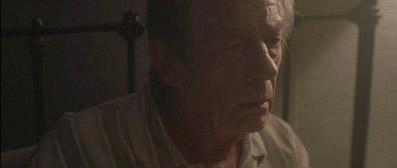
The Dolby 2.0 mono track on the 1968 version is a clearer than you might expect, and copes well with the atmospheric and occasionally alarming use of sound effects and occasional sharp volume shifts.
Unsurprisingly, perhaps, the 2010 version is Dolby 2.0 stereo and clear as a bell. The drones and bass notes of Nick Green and Tristin Norwell's creepy score are particularly well rendered.
All of the extra features here, except the Jonathan Miller/Christopher Frayling interview and the booklet, have been ported over from the BFI's 2001 stand-alone DVD, which has since been deleted.
Ramsay Campbell Introduction (15:39)
When you elect to play the 1968 adaptation, you are given the option to do so with or without this introduction by author Ramsay Campbell, which has been shot on DV with Campbell seated so that his face is in shadow, with the sound recorded on what sounds like the on-camera mic – the acoustics of the room are less than great and there is the sort of hum running quietly in the background that I tend to associate with camera noise. That aside, Campbell does deliver gives a useful history of James' work and his influence on later authors, as well as reading many key extracts from key works by James and others. Campbell is no actor and his readings are a little dry, and are done no favours by the room's acoustics, but his analysis of Miller's film adaptation is well worth hearing, and his suggestion of a Freudian reading for its imagery should raise a few eyebrows.
Jonathan Miller and Christopher Frayling on Whistle and I'll Come to You (1968) (3:23)
Two very short clips of interviews with Jonathan Miller and Christopher Frayling – for my money two of the most intelligent and compelling interviewees on the planet – that were not used in David Thompson's BBC Arena profile of Miller, which was first broadcast in March of this year. Miller unsurprisingly dismisses the whole concept of the supernatural and reveals that it was he who encouraged Michael Horden to adopt his "philosophical" mode of speech (something he then demonstrates in what almost plays like an impersonation of Horden's performance), while ever-impressive Frayling absolutely nails one of the things that makes the film work as well as it does when describes its ghosts as being "in the corner of the retina." It seems likely that copyright issues prevented the use of any extracts from the actual programme, which does mean this plays like a frustratingly brief taster for a rather delicious looking meal that we are unable to eat.
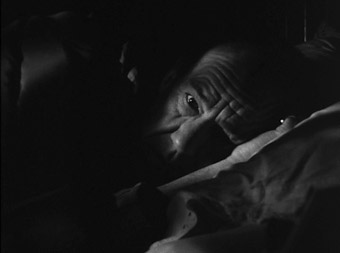
Neil Brand Reads M.R. James' Original Story (41:36)
Possibly the best extra on the disk, with Neil Brand providing a nicely animated reading of the story on which both films are based, and unless you have a major aversion to someone else supplying voices to characters you prefer to create in your head, this is most enjoyable listen. It enables those new to James' work to judge how both adaptations compare to the original text, and intriguingly, despite some differences between the original story and Miller's adaptation, the reading runs almost the exact same length as the film, being just 18 seconds shorter. The only problem for plasma screen owners is that the same image and text remain on screen for the whole 41 minutes, which does risk causing some serious burn-in.
Ramsay Campbell Reads 'The Guide' (26:45)
Campbell reads his own story, The Guide, which directly references James' work. This was clearly shot at the same time as the introduction, and while Campbell is more animated in his reading here, the same problems with room acoustics remain. Attempts to provide visual variety with occasional cutaways of the book being read or imagery described (wheat in the wind, landscapes) add little, and the introduction of an oscillating sinister synthesiser note is equally ineffective. You might be better off getting your hands on the story and reading it yourself.
Booklet
A content-busy booklet that also happens to be a very worthwhile read, with two engaging essays – one by Mark Fisher, the other by Reggie Oliver – on the original story and the film adaptations, and biographical pieces on M.R. James, Jonathan Miller, Michael Horden and John Hurt. You'll also find details of the extra features, the transfers, and credits for both films. Interestingly, while Fisher and Oliver both praise aspects of the remake, they devote considerable fewer words to it than they do Miller's original, which they openly admire.
Worth buying for Jonathan Miller's 1968 adaptation alone, which remains my all-time favourite televisual ghost story. How you react to the remake may well depend on how fond you are of the original and how well you know the M.R. James story, and while I'm not a big fan of the newer film, I applaud its inclusion and would still urge to you see it, through more for Hurt's performance than its deviations from the text. The extras may vary a little in technical quality and the interviews feel way too short, but I'm not complaining about the content. It's a fine start to the series, and definitely comes recommended.
|